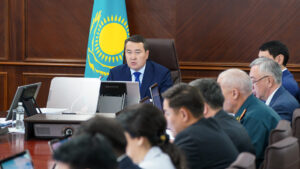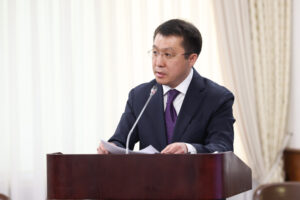ASTANA – Kazakh officials discussed measures to develop the civil aviation industry and outlined tasks for the coming period, focusing on aviation safety, route network and infrastructure development during a May 30 government meeting chaired by Prime Minister Alikhan Smailov, reported the Prime Minister’s press service.

Alikhan Smailov. Photo credit: Prime Minister’s press service
According to Kazakh Minister of Industry and Infrastructure Development Marat Karabayev, Kazakhstan’s level of compliance with the aviation safety standards reaches 82%, the highest figure among the Commonwealth of Independent States countries.
In 2022, the country’s airlines carried 11 million passengers, which is 17% more than in 2021 (9.4 million people).
In January-April this year, the number of passengers increased by 38% compared to the previous year and reached 3.6 million people.
To date, three domestic and 26 foreign airlines operate international flights to 27 countries via 103 routes. Flights are performed to eight CIS countries via 46 routes; seven countries of the Middle East via 34 routes; seven countries of Southeast Asia via 16 routes; and five European countries via seven routes.
This year, it is planned to launch 18 more international routes, nine of which are already available. Air carriers resumed Astana – Beijing, Almaty – Samarkand, Astana – Baku, Astana – Urumqi and Almaty – Xian flights and launched flights between Almaty – Sharm El Sheikh, Astana – Sharm El Sheikh, Astana – Xian – Beijing, and Shymkent – Delhi.
According to Karabayev, another nine international routes are expected to launch to Ankara, Doha, Jeddah, Karachi, Kuala Lumpur, Lahore, Muscat, Prague and Tel Aviv by the year-end.
Flights to Hong Kong, Mumbai, New York, Singapore, Tokyo, Vienna and other locations are expected to launch by 2025.

Kazakh Minister of Industry and Infrastructure Development Marat Karabayev. Photo credit: Prime Minister’s press service.
He also focused on issues hindering the development of civil aviation, notably, the lack of highly qualified personnel, infrastructure, and the shortage of jet fuel in the domestic market and its high cost.
“It is necessary to increase the annual volume of jet fuel production to 1 million tons per year, which will help to eliminate the deficit in the domestic market and dependence on imports,” Karabayev said.
The minister announced plans to increase the level of compliance with flight safety standards to 90%, reconstruct airport terminals nationwide and complete the construction of new terminals at Shymkent and Almaty airports.
Following the report, Prime Minister Smailov highlighted that the expansion of international routes contributes to the development of trade, economic, investment, tourism and cultural cooperation between Kazakhstan and other countries.
He also outlined several problems in the aviation industry that need to be addressed, including repair of runways, jet fuel production, flight cancellations and the pricing policy.
“The so-called fuel surcharge, which logically should depend on changes in the price of aviation fuel, remains at the same level in the ticket price. Therefore, it is necessary to reconsider the attitude to pricing, and constantly work to improve the air transportation service and the quality of service. The interests of passengers should be a key priority,” Smailov said, instructing relevant state bodies to prepare roadmaps for the modernization of the airport infrastructure, carry out work on the seizure of illegally issued land plots near airfields, and increase the production of jet fuel.
